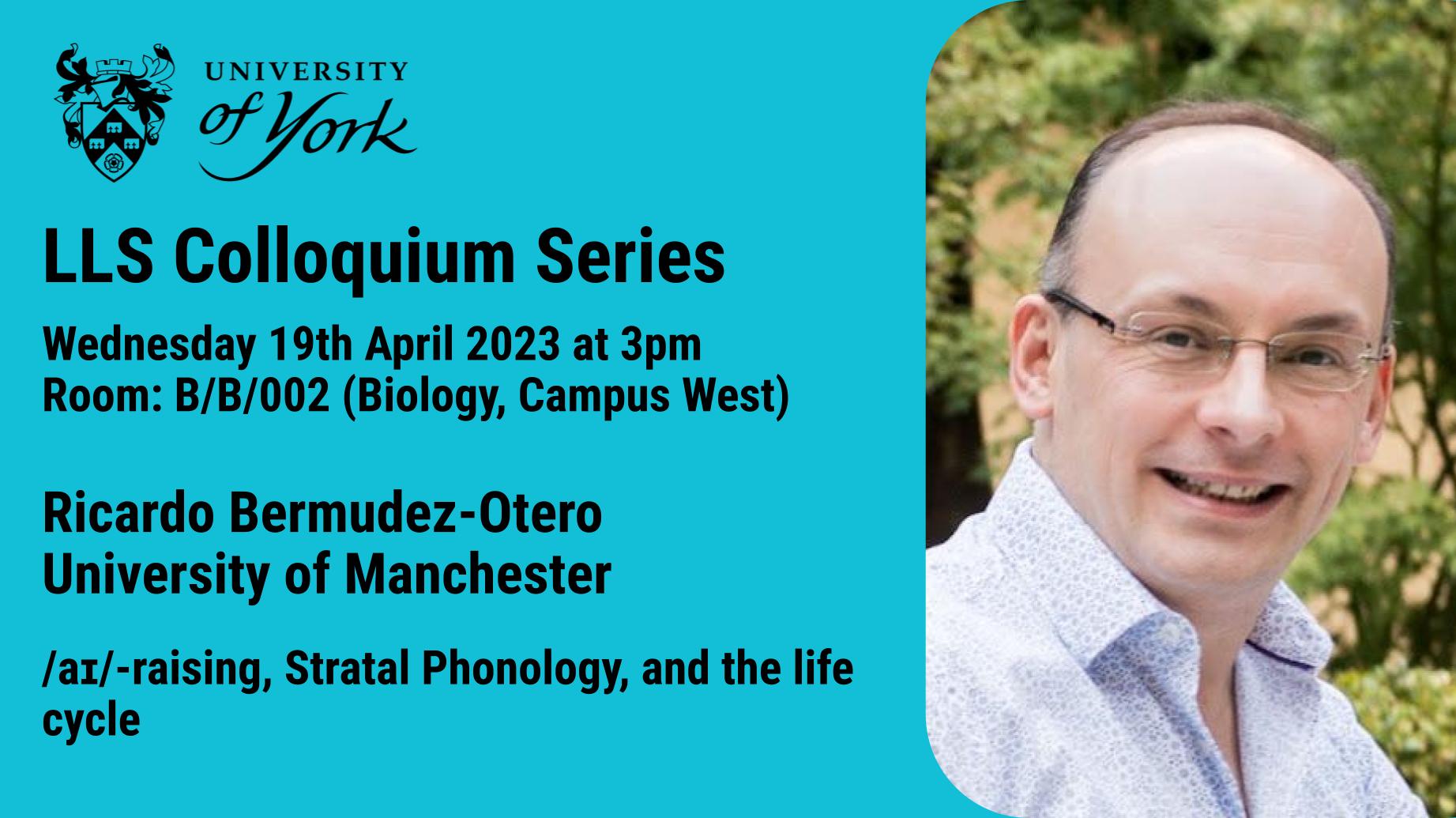LLS Colloquium: /aɪ/-raising, Stratal Phonology, and the life cycle

Wednesday 19 April 2023, 3.00PM
Speaker(s): Ricardo Bermudez-Otero (University of Manchester)
On Wednesday 19th April 2023, Ricardo Bermudez-Otero (University of Manchester) will be presenting on "/aɪ/-raising, Stratal Phonology, and the life cycle".
Talk: /aɪ/-raising, Stratal Phonology, and the life cycle
The process of prefortis /aɪ/-raising found in many dialects of English, specially in North America (Davis & Berkson 2021), notoriously overapplies before flapped /t/: e.g. writer [ɹʌiɾəɹ] ~ rider [ɹaɪɾəɹ] (Joos 1942, Chambers 1973). This apparently opaque interaction has been observed even in dialects where raising remains in its gradient phonetic stage (Kwong & Stevens 1999), and even in dialects where raising is diachronically younger than flapping (Fruehwald 2013). These facts pose a major prima facie challenge to modular feedforward architectures of grammar and to the theory of the life cycle of phonological processes (Bermúdez-Otero 2007, 2015): young gradient processes should be transparent and should not be counterbled by older categorical rules.
Bermúdez-Otero (2014) offered a solution couched in the framework of Stratal Phonology (Kiparsky 2000; Bermúdez-Otero 2010, 2018). He proposed that /aɪ/-raising first arises as a gradient phonetic enhancement of prefortis clipping , which itself initially arose as a phonetic enhancement of the laryngeal contrast (Gussenhoven 2007, 2017; cf. Moreton 2004, Moreton & Thomas 2007). Long ago, however, prefortis clipping underwent stabilization and domain narrowing to become a noncyclic stem-level process. Gradient phonetic /aɪ/-raising appears to overapply before flapped /t/ because, in reality, it targets categorically clipped tokens of the diphthong, and clipping itself, being stem-level, is counterbled by phrase-level flapping. Once phonologized, however, /aɪ/-raising may itself go on to undergo stabilization and eventually climb up to the stem level by rule telescoping.
Bermúdez-Otero’s (2014) account of /aɪ/-raising makes certain subtle predictions that are corroborated by more recent discoveries. Notably, /aɪ/-raising in its mature categorical form typically sustains lexical exceptions (Vance 1987, Fruehwald 2007), and it is therefore predicted to undergo cyclic misapplication in accordance with a theorem of Stratal Phonology known as Chung’s Generalization (Bermúdez-Otero & McMahon 2006: §3.4, Kiparsky 2007, Bermúdez-Otero 2012: 31-33). The predicted cyclic misapplication effects were strikingly absent from classical descriptions like Chambers (1973), but they have now been observed: e.g. Moreton (2016) describes a Mississippi dialect that exhibits normal stress-conditioned nonapplication of raising in cìtátion and tìtánic, but cyclic overapplication in tỳpólogy and Hittìtólogy. The contrast between titanic and typology is explained by an approach to stem-level cyclicity based on nonanalytic listing: this correctly predicts that such effects will be sensitive to the relative token frequency of base and derivative (Bermúdez-Otero 2012: 34-39; see also Dabouis 2017).
In addition, Bermúdez-Otero’s (2014) account entails the absence of type-B dialects, in which /t/-flapping bleeds /aɪ/-raising (Kaye 1990; cf. Joos 1942). Yet recent research has documented the existence of speakers who do produce alternations like write [ɹʌit] ~ writer [ɹaɪɾəɹ] (Berkson et al. 2017, Bissell & Carmichael 2022). In Bermúdez-Otero’s (2014) model, however, such alternations do not reflect a bleeding derivation; rather, they arise at the initial stage in a diachronic cline of rule generalization (Bermúdez-Otero 2015: 393-395; see also Hall 2022) in which raising is at first circumscribed to monosyllabic feet: i.e. wipe [wʌip] ~ viper [vaɪpəɹ] (Bermúdez-Otero 2017: §37-§41). This alternative explanation has been vindicated in at least one instance: Fort Wayne, Indiana (Davis et al. 2019).
Thus, as in similar cases (e.g. Bailey 2021), /aɪ/-raising, though apparently recalcitrant at first, turns out to provide striking support for Stratal Phonology and the life cycle of phonological processes.
The talk will take place at 3pm, and there will be an opportunity to ask questions at the end. There will also be an informal wine reception afterwards in the Department of Language and Linguistic Science (Deborah Hines Room, 2nd floor). Everyone is welcome!
Location: B/B/002 (Biology, Campus West)
